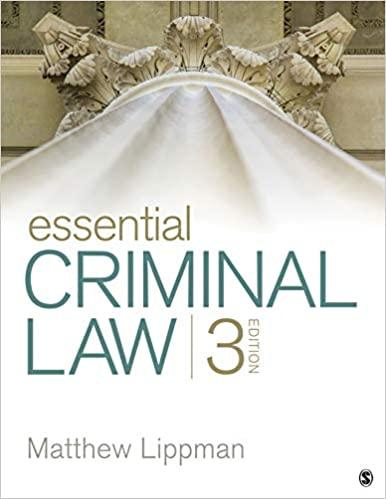Question
1.What are the three organs of state? a)The bureaucracy, the executive, and the legislature b)The bureaucracy, the executive, and the judiciary c)The bureaucracy, the judiciary,
1.What are the three organs of state?
a)The bureaucracy, the executive, and the legislature
b)The bureaucracy, the executive, and the judiciary
c)The bureaucracy, the judiciary, and the legislature
d)The executive, the judiciary, and the legislature
2.In a parliamentary system, members of the executive are drawn from which of the following institution?
a)The bureaucracy
b)The legislature
c)The judiciary
d)None of the above
3. How are seats in the House of Commons distributed?
a)According to the geographical size of each province
b)According to the population of each province
c)According to the economic contribution of each province
d)None of the above
4.Which of the following pairs of state institutions are partisan in nature?
a)The bureaucracy and the legislature
b)The executive and the legislature
c)The executive and the judiciary
d)The judiciary and the legislature
5.Which of the following pairs of state institutions are non-partisan in nature?
a)The bureaucracy and the executive
b)The bureaucracy and the judiciary
c)The executive and the judiciary
d)The judiciary and the legislature
6. What is judicial neutrality?
a)The freedom of the courts from any external influence
b)The freedom of the courts from the influence of the bureaucracy
c)The freedom of the courts from the influence of the legislature
d)The freedom of the courts from the influence of the executive
7.From an institutional viewpoint the Canadian state is a fusion of which of thefollowing two elements?
a)The American parliamentary system and the British House of Lords
b)The British parliamentary system and the American Senate
c)The British parliamentary system and American-styled federalism
d)The American parliamentary system and British federalism
8. Canada is a democracy as well as a constitutional monarchy. What is a constitutional monarch?
a)A sovereign who reigns and rules
b)A sovereign who reigns but does not rule
c)A sovereign who neither reigns nor rules
d)A sovereign who designs the constitution
9.Who is the Canadian head of state?
a)The monarch
b)The Prime Minister
c)The Speaker of the House of Commons
d)The Supreme Court of Canada
10. Who is the Canadian head of government?
a)The monarch
b)The Prime Minister
c)The Speaker of the House of Commons
d)The Supreme Court of Canada
11. How is federalism defined?
a)A division of powers between central and municipal governments such that neither is subordinate to the other
b)A division of powers between central and municipal governments such that the latter is subordinate to the former
c)A division of powers between central and regional governments such that neither is subordinate to the other
d)A division of powers between central and regional governments such that the latter is subordinate to the former
SHORT-RESPONSE QUESTIONS
12.Some state institutions are given the label 'organs of state' to highlight their special status. What distinguishes organs of state from other more ordinary state institutions?
13.With reference to Question 7, explain the potential contradiction in the institutional design of the Canadian state.
14.Seats in the Senate are distributed differently than seats in the House of Commons: explain the thinking behind this from the perspective of less populated provinces.
15.Canada is composed of 10 provinces and three territories. Conduct your own research and briefly explain the constitutional distinction between provinces and territories where their relationship with the federal government is concerned.
Step by Step Solution
There are 3 Steps involved in it
Step: 1

Get Instant Access to Expert-Tailored Solutions
See step-by-step solutions with expert insights and AI powered tools for academic success
Step: 2

Step: 3

Ace Your Homework with AI
Get the answers you need in no time with our AI-driven, step-by-step assistance
Get Started


